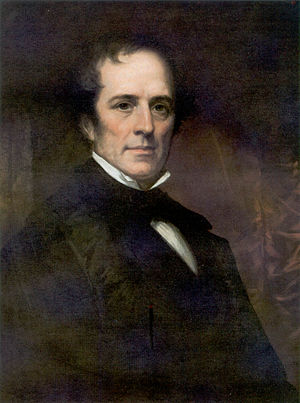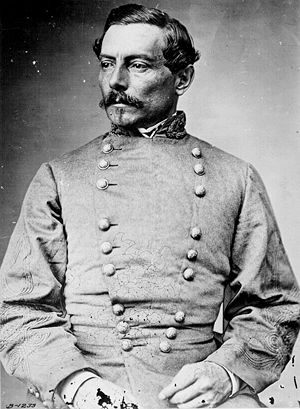- [SIEGE OF FORT SUMTER] This morning Major Anderson resumes firing on the Confederate forces. A Confederate hot shot sets fire to the officers' quarters and spreads to the barracks. After a small amount of powder is obtained, Anderson closes the magazines to prevent an explosion. Seeing Fort Sumter on fire, Southron batteries double their fire. Flames leap above the parapets. Smoke in the casemates hinders the garrison from operating the guns. Firing is cut almost to nothing, but they continue as much as possible. With each shot, the Southrons mount their parapets and cheer their enemy's gallantry. Finally Fort Sumter ceases fire. About 1:30pm, a Confederate shot brings down the flag.
 |
| Explosion inside Fort Sumter |
Then an explosion occurs on Fort Sumter. Soon afterwards, former
US Senator, now Confederate Colonel Louis T. Wigfall with a
flag of truce approaches Fort Sumter, crawls through an embrasure, and asks to speak with Major Anderson. The Cummings Point batteries have ceased firing, but
Fort Moultrie continues.
While Anderson is being notified of a visitor, Colonel
Louis T. Wigfall suggests that they raise a white flag to stop Fort Moultrie's firing, but the men reply that only Major Anderson could do so. Then Wigfall waves his truce flag, but Fort Moultrie continues to fire. Major Anderson soon arrives and Wigfall offers him any terms of surrender he wants. Anderson, out of food and with an insufficient number of men to properly garrison the fort, concludes that further conflict is useless and that his men had done their best despite great difficulty.
Major Anderson accepts the terms offered by
General Beauregard on the 11th. By 2:30pm, the Southern forces see a white flag flying from the ramparts. At 7:30pm the terms are accepted on both sides and the battle ends. The officers' quarters and barracks were destroyed in the bombardment and fire, but the walls are hardly damaged. Thirty-four hours and 3000 shot and 40,000 shells had been spent in the battle, with no lives lost on either side and only a few wounded. Major Anderson remains in charge of the fort until tomorrow noon./1861
- [SIEGE OF FORT SUMTER] For Gustavus Fox and his Sumter Relief Expedition watching the battle outside Charleston Harbor, thick fog and heavy swells delay their attempts to load boats with provisions for Sumter. Determined to carry in at least some supplies, the Pawnee captures an ice schooner and makes it available to Fox for an attempt that evening. Captain Gustavus V. Fox hopes to send in the captured ice schooner tonight, but alas, he sees the white flag over Fort Sumter. About the time Fort Sumter stops firing, the Pocahontas arrives about 2:00pm, but the essentials, the Powhatan and the tugs, never arrive. The Powhatan had been removed by the Lincoln Administration in all its sagacity in a secret and wholly impractical maneuver authorized by Lincoln to aid the Federals at Fort Pickens, Florida. The other ships of the Relief Expedition have been scattered all over the seaboard. Bad weather has stopped the tugs. The Freeborn's owners had prevented her from sailing because of the gale; the Uncle Ben was driven into Wilmington, North Carolina, by the gale, and the authorities there seized it. The Yankee overshot Charleston because of the storm which drove her to the entrance of Savannah, and she did not get back to Charleston until the Baltic had returned north with Anderson's garrison. Fox expects he would have "certainly been knocked to pieces" should he try to reinforce Fort Sumter, but he does not get a chance. Anderson surrenders the fort first./1861
- The people of Richmond, Virginia, receive news of the surrender of Sumter, and in response, great delight is exhibited and 100 guns are fired. As farmers rush to town to hear the news, bonfires are kindled, rockets sent up, tumultuous excitement reigns. The bells of Richmond toll all night, cannons boom, shouts of joy are heard, and "Dixie's Land" is heard on each of the seven hills of Richmond. People denounce the Virginia Convention's tardiness in achieving Secession; attempts are made to fly the Stars and Bars from the Capitol Dome, and shouts of hurrah for the hero Beauregard, the Southern Confederacy, and "Down with the Old Flag!" Tomorrow is the Sabbath and all demonstrations will be quieted in respect for the day, but talk of it continues except at worship/1861






































